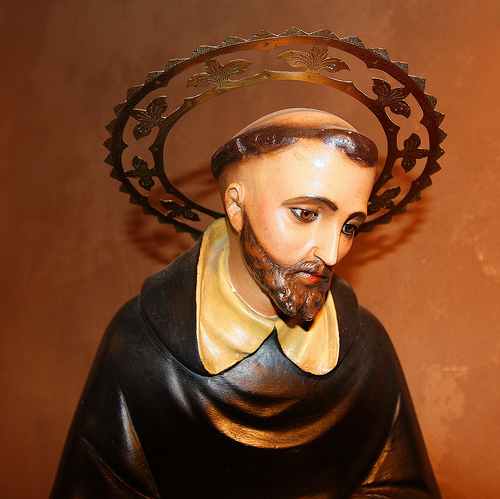
I wonder sometimes whether readers think it is odd that I blog on a classic Reformed text like the Heidelberg Catechism one day and on saints of the Catholic and Orthodox world the next. From Calvin’s time onward, a good deal of Reformed ink has been spilled ridiculing Catholic devotion to the saints. Take my beloved Heidelberg as an example:
30 Q. Do those who look for their salvation in saints, in themselves, or elsewhere really believe in the only savior Jesus?
A. No. Although they boast of being his,
by their actions they deny the only savior, Jesus.
Either Jesus is not a perfect savior,
or those who in true faith accept this savior have in him all they need for their salvation.
At first glance it seems perfectly clear; and a tad hostile. Are they saying anyone who has good things to say about St. Benedict or St. Teresa of Avila is doomed?
Actually no.
I’ve certainly met Protestants, inside and outside my denomination, who seem to think that this is so — people for whom anything Catholic is a big problem, saints included.
And I’ve heard people react to this section of the Catechism, along with several others, as if it is completely condemning that largest branch of Christianity.
But look closely at the reasoning of the question and answer: It does not ask whether someone loves the saints, or even (yet) bring up the question of praying to them.
Specifically the issue is people who think their salvation will come from the saints.
Any reasonable saint would forbid that. Salvation comes through the grace of God revealed in the person and work of Jesus. Their faithfulness to Jesus is what made them saints.
However, in 1563, newly converted Protestants could listen to the zealous but undereducated peasantry — or maybe remember their own childhood faith — and find people convinced that the saints were the key to salvation.
Sometimes we Reformed types see people misusing something good, so we toss the whole thing. We don’t leave room for people to use the good thing well.
It is a failure of the “baby—bathwater dialectic.”
Here is the thing: Christ has always had faithful followers; not just today. We are neither the first, nor the wisest, nor the most loving of his servants.
- Some of those followers were heroic in standing up to persecution and temptation, even at the cost of their lives.
- Some of those followers were brilliant at thinking through questions and problems, leaving insights that continue to help us understand our faith centuries later.
- Some of those followers drew so close to Christ that their lives were transformed, leaving a legacy of love and service.
The Church calls them “saints.” People today would do well to think of them as “role models” and “mentors” and “coaches.”
Yes, all the faithful are, in a good sense, set apart for holiness — saints. But we all need role models, mentors, and coaches who have gone farther than we have in the journey.
Who is your favorite saint (Christian role model, mentor, or coach) living or dead?
————
I doubt it will be grounds for sainthood, but I’d love it if you shared the post using the buttons below!

Augustine
Excellent choice! I’d love to hear which of his works you’ve enjoyed.
On Grace and Free Will. Do you have a favorite?
I absolutely love the Confessions, but there are lots of others I love for different reasons. On Christian Doctrine, City of God, Letter 103 to Proba (on prayer), some of the sermons, some of the writings on the Manichees… But I know the Confessions best and love it most.
Is Confessions available ebook? And I need something uplifting during a dark cold winter? Which one would you recommend first? Ps also a huge Tozer fan. He makes me think. LOL